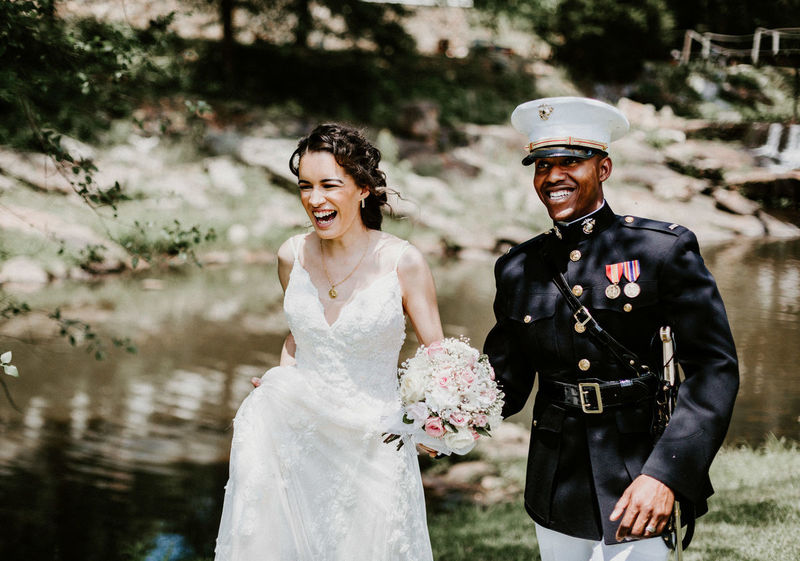How to Communicate Effectively With Couples and Save Your Sanity

This article was written by Bethel Nathan, Owner & Business Coach/Speaker at Elevate by Bethel.
What is “just right” communication with your couples? My definition is having a communication plan that has my business communicating with all my couples consistently, and in a way that:
- Gives them the information they want and need while…
- Getting me the information I want and need — and it does all of that while…
- Meeting, or exceeding, the expectations of my couples, as well as…
- Fitting within a time budget developed to keep me both sane and profitable
A bit long of a definition so let’s break it down by the main points:
Consistency
Your planned communication timing, amount, and quality are designed to be the same for every couple. Which doesn’t mean you can’t change something based on a specific couple or wedding, it just means that every couple feels the love and attention in pretty much the same way.
Couples’ expectations
Ultimately, your communication strategy, and the tools used to apply that strategy, need to be designed based on your ideal couples. For example, the mix of communication types and the style of communication for a high priced, low volume Wedding Planner should be very different from those used by a low priced, high volume Officiant. No business model is “wrong” – as long as it meets your profitability and time needs. Therefore, it is very important to understand that the communication you have with your couples needs to provide a customer experience that closely matches (or exceeds) their expectations.
Time budget
Your communication plan fits your business time budget.
By knowing how much time you have, what information you want to communicate, and your ideal client’s expectations, you can focus your communication spend on the important communication touch points, and automate or remove others.
Developing a Communication Plan
Before revising or developing a communication plan, there are two other important things to remember. Although each of us gets older every year, our couples stay relatively the same age. This means that our communication plan must match what they are expecting and not just be what we have used for ages (even if it worked well in the past).
Also, don’t forget to also think about communication with other vendors when developing your strategy and plan. Properly communicating with those you are working with on a wedding can increase your visibility and your perceived professionalism – and, as we know so well, other vendors are often where many of our referrals come from.
To create a communication plan that fits your business, it is easiest to separate the process into two main steps:
Step 1
Calculate the average number of hours you want to, or currently, spend communicating on that specific wedding. The calculation should include calls, in-person meetings, creating and sending of emails, etc., and a bit of time for unscheduled communications.
Step 2
Map out a communication plan that best utilizes all the different communication tools and takes into consideration the number of hours that you want to spend per couple. Think of each touchpoint and ask yourself, “what is the level of importance to me and/or my couples?” Remember, something that might not be that important to you could be very important to them and thus something that is very important to your business.
Since each business is different, I can’t just provide a single communication plan that fits all. However, we can take a look at the different communication touch points that are reasonably standard to all of us in the wedding industry.
Communication Touch Points
Inquiry communication
This is where communication method and the amount of time is hard to plan for, but I do have a few recommendations.
- Communicate back within a reasonable period of time. If you have some information that you almost always provide back (e.g. a pricing breakdown) or some questions that you almost always need to ask (e.g. how many guests), have them handy no matter where you are.
- Answer all questions that were asked – and if you can’t answer them without more information, explain why you need the “more information” and request it.
- Communicate back in the same method they used, unless otherwise instructed. If they call, you can call. If they email or use messages, please email or message back and don’t try to call.
Initial meeting or consultation
Your business model will determine your initial meeting communication strategy – in-person, phone, online – but you also need to be flexible based on where the couple resides and their requested preference.
Booking process
Please don’t make it hard for them to book you and give you money. Truly. We live in more modern times and your couples have likely always lived in those modern times. Electronic contracts and electronic payments are easier for you and easier and more comfortable for them.
After-booking communication
Whether it’s an automated email or a templated email which you personalize before sending, it should give them an idea of next steps, timeline or workflow, and reiterate communication expectations. Some wedding professionals, especially those at the higher-end and with a more complicated process, find that the creation and distribution of an “onboarding” document or packet is very helpful in setting proper expectations and fits with their brand.
Your in-process workflow
It is only a positive for your business, and your sanity, to have a standard workflow that applies to each wedding or level of service purchased – even if it is adaptable based on that specific couple’s (or wedding’s) needs. The workflow should have set communication points, and you schedule on your calendar and/or in your system any non-automated communication point within the workflow (a two-week final reminder email, a month-out check-in call, time to schedule a venue walk-through, etc.).
Information giving/gathering
Electronic communication usually works very well here. Depending on your level of service, you can determine which emails you send would be automated, which would be templated, and which would be completely personal. And, if you need to get a bunch of information, online questionnaires are a fantastic tool to use, often getting better responses than asking for those questions to be answered in an email. If your process includes having a scheduled call or an in-person meeting with your couple, send them the discussion points beforehand so they can be prepared. This reduces the amount of back and forth after the meeting and makes sure that no one feels like the meeting was a waste of time.
Unscheduled communications
Although you can’t completely control this, set expectations early on with your couples about how you are going to communicate with them, how best they should communicate with you, and what response time to expect.
After-event or after-service follow-up
If you work with a lot of couples and just want to congratulate them, thank them, and ask for reviews, this could be an automated email, but I don’t recommend it. Each couple/wedding is unique and we are in a very personal business, so instead I recommend a templated email that you then personalize based on the couple. I always try to remember one or two memorable things from my time at the wedding and add it to the thank you (it was great meeting your parents, your nephew came through with the rings after all, etc.).
Evaluating Your Communication Plan
And don’t forget to evaluate your communication plan by:
- Looking at your reviews. Are the couples talking up how well you communicated with them, not talking about it at all, or talking about it in the negative? Use this to determine what is working well and what needs change.
- Keeping track of the questions that shouldn’t be asked or missing items. Are you getting a lot of questions from your couples, yet the answers were in earlier communications? Are you frequently getting to certain points in your process and still missing items that you requested from your couples? Are you consistently, or somewhat consistently, forgetting to tell your couples something?
Just remember, your business, your couples, and your technology are always evolving, and thus so should your communication plan.
 Bethel Nathan is a San Diego based wedding officiant, business coach, and industry speaker. Combining her years of corporate and small business experience with a love for marrying awesome couples, Bethel built Ceremonies by Bethel, a successful and award-winning Officiant business. And although still officiating, Bethel now has another love… helping others turn their passions into successful and sustainable businesses. Learn more at www.elevatebybethel.com.
Bethel Nathan is a San Diego based wedding officiant, business coach, and industry speaker. Combining her years of corporate and small business experience with a love for marrying awesome couples, Bethel built Ceremonies by Bethel, a successful and award-winning Officiant business. And although still officiating, Bethel now has another love… helping others turn their passions into successful and sustainable businesses. Learn more at www.elevatebybethel.com.
Photo by Lunalee Photography
Let's grow your business together!
Start advertising on The Knot and WeddingWire, the top two wedding planning platforms.
What is new!
- Sneak Peek: The Knot Real Weddings Study for Vendors
- Navigating a New Era: Venue Insights from The Knot’s 2026 Real Weddings Study
- Navigating a New Era: Vendor Insights from The Knot’s 2026 Real Weddings Study
- Wedding Marketplaces and How They Work
- The Marketing Metrics Every Wedding Pro Needs to Know

